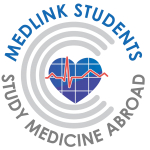
Located in: Cyprus
















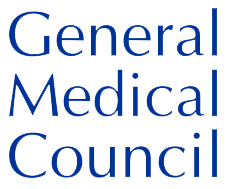





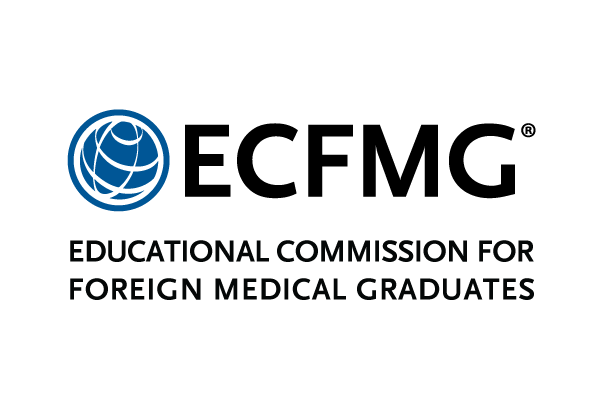



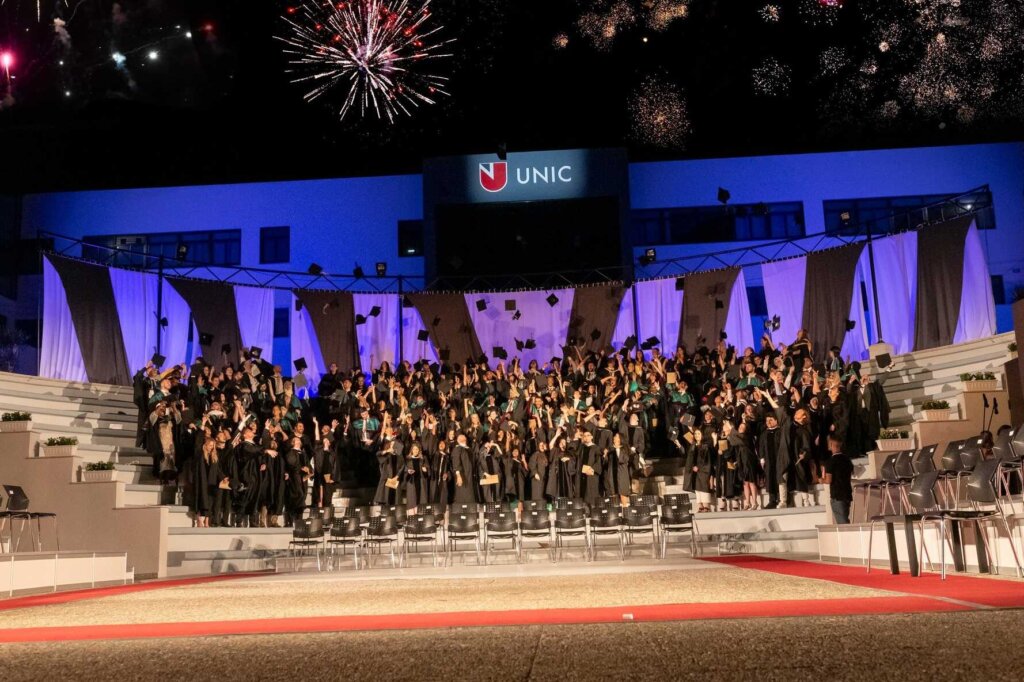

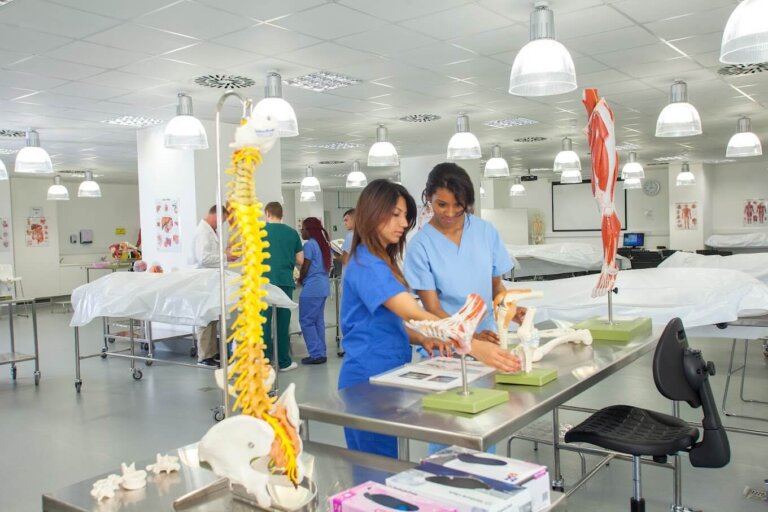

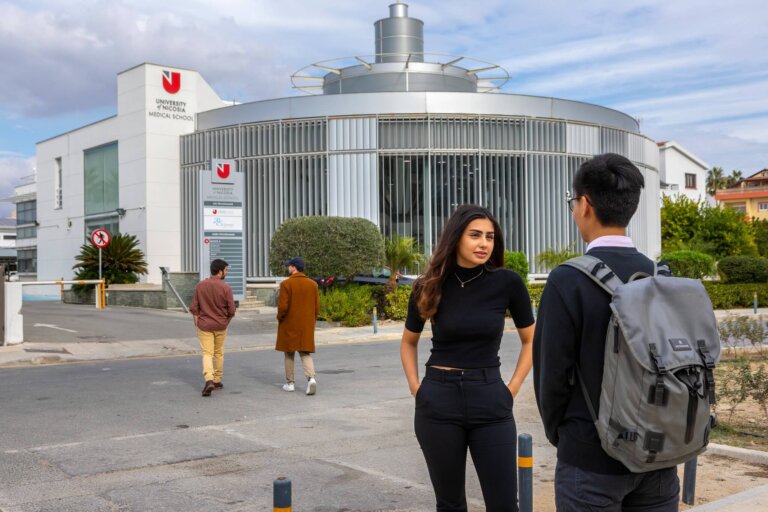

The University of Nicosia is located in Nicosia, the largest city and capital of Cyprus. It was founded in 1980, with the main campus in Nicosia. More than 12,000 students from over 70 countries choose the university. The main goal of the University of Nicosia is to reach and maintain the highest quality of teaching, research, community service, and patient care.
The university is devoted to innovative, student-centred, and high-quality education.
They teach their students about the highest priority of being a doctor-patient care. The university is doing its best to make graduates become successful practitioners, researchers, teachers, and administrators.
University of Nicosia's address is 46 Makedonitissas Avenue, CY-2417, Nicosia, Cyprus.
University of Nicosia Core Values:
The University of Nicosia Medical School offers a 6-year MD degree programme dedicated to high school graduates.
There is also a graduate entry pathway into medicine at the University of Nicosia and a 5-year undergraduate entry degree into Veterinary Medicine (DVM)
The Medical School at the University of Nicosia encourages students to take part in scientific activities as an extracurricular activity. The priority research fields include brain health, cancer biology, regenerative medicines, and infectious diseases.
Moreover, students can join a diverse array of clubs and student organisations on campus. Some, like the Badminton Club or Running Club, foster athletic endeavours. Others, such as the Paediatric Society and Surgical Society, cater to academic interests. With over 20 organisations on offer, students are guaranteed to find a group that aligns with their preferences.
Here you have the opportunity to study medicine in English in a 6-year course.
The tuition fees are:
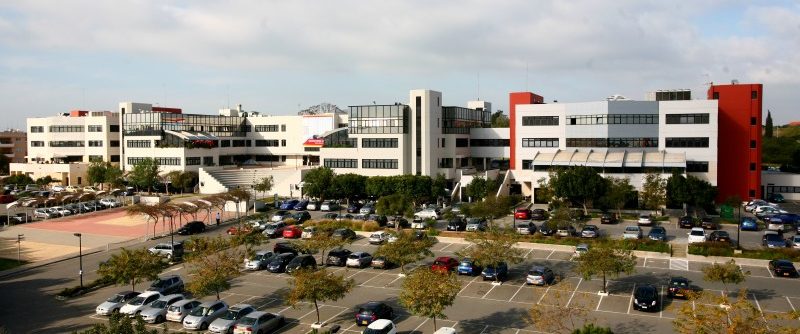

High School leaving certificate
English Language requirements
Applicants coming from the UK, Ireland, USA, Canada, Australia, and New Zealand don’t need a certificate as long as their graduation is from an English-speaking high school.
An online interview
The interview checks whether applicants have the right characteristics and interpersonal skills to find success in the medical field. Previous experience and understanding of the profession through volunteer work are greatly appreciated.
Students applying for the graduate entry pathway into medicine at the University of Nicosia will need to:
1. Have a Bachelor's Degree
Applicants must have a bachelor’s degree with at least a 2.2 class honours or equivalent GPA. Degrees from all fields are accepted.
2. Pass a standardised entrance examination
Additionally, students will need to achieve the following scores in 1 of these exams:
Please note that UCAT is accepted only for candidates who have a Bachelor's degree in a science-related field with a 2.2 class honours or equivalent GPA. The GPA equivalent is between 2.7-3.0 or more out of 4.00, typically within the 50-59% of scores.
3. Demonstrate English language proficiency
Students from non-native English-speaking countries will need to have 1 of the following scores to get admitted to the grad entry programme:
4. Participate in an online interview
The goal of the interview is to check whether applicants have the appropriate personal attributes and skills to complete the programme and become successful doctors. Typically, applicants should demonstrate that they are suitable for the medical profession by showing an understanding of biological, psychological and social aspects of medicine. Voluenteer experience is grealy appreciated.
High school certificate
Each student needs a high school certificate with a minimum score of 90%, with a focus on Chemistry and Biology.
Another option is to have ABB grades on GCE A levels or Baccalaureate scores of 32 again in the same subjects.
People with a bachelor's degree in similar fields can also apply for first-year admission.
English Language Proficiency
A minimum of 6.5 in IELTS is required, or you can use a minimum of 79 in TOEFL iBT. The grade in GCSE you need is a minimum of 5 or corresponding scores in IB and European Baccalaureate.
There is an exemption for students coming from English-speaking high schools in a number of countries.
Interview
The last step in the admission process is the interview. It can be done in person or online. During that interview, there will be a great emphasis on volunteer work and multidimensional aspects of veterinary.
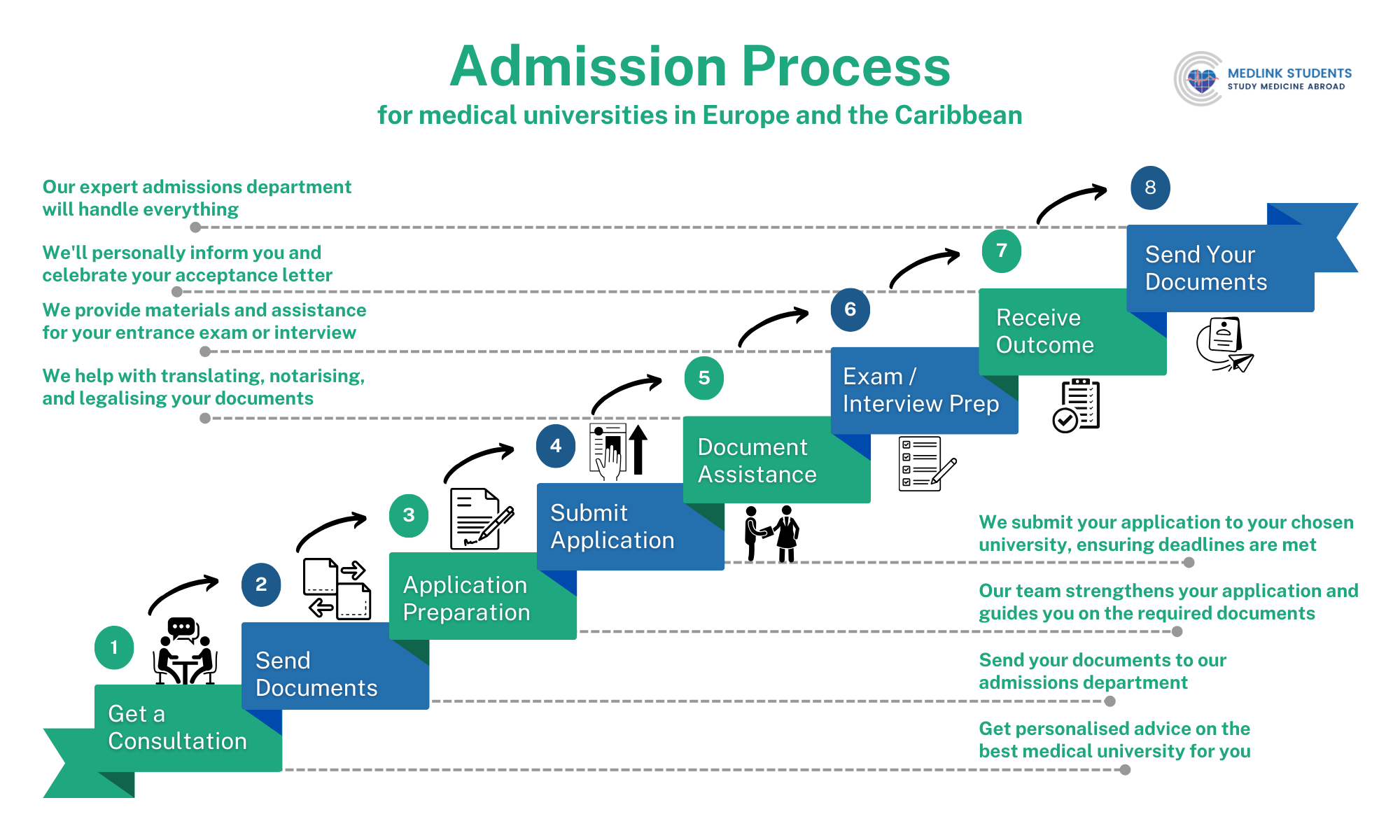

The University Of Nicosia Medical School is known for providing high-quality medical education with no entrance exam requirements, which makes the competition for it absolutely fierce. Your success largely depends on your grades from high school and the strength of your application. Additionally, the admission process can be confusing and tiring to navigate, with strict prerequisites and legal procedures that must be followed. This includes submitting specific documents that need to be translated, notarised, and legalised. Failure to meet these requirements will result in application rejection. However, you don't have to face this challenge alone. Our admissions experts are widely acknowledged as the best in Europe and can manage your entire application from start to finish. We will take care of all the required legal procedures and guarantee your acceptance by making sure that you submit an exceptional application. We have formed a partnership with the University of Nicosia, and we possess in-depth knowledge of their application system and interview format. With our support, you can avoid the exhausting process of applying to a medical school abroad and focus on what truly matters – preparing for the interview and your future medical studies.
Students aiming for first-year entry into Medicine, Dentistry, Pharmacy, and Veterinary Studies in Europe and the Caribbean can find additional details and helpful guidelines here.
Mrs. Eleni, a representative from the University of Nicosia Medical School, spoke in a recent Medlink Students webinar, highlighting the university’s global reach and its commitment to student success. Mrs. Eleni also emphasized the strong partnership with Medlink Students, recommending our services to ensure a smooth application process. Watch the full interview in the webinar here.


The University of Nicosia Medical School also offers a comprehensive 5-year graduate entry MD programme (GEMD). This streamlined medicine course is designed for students who hold a Bachelor’s Degree in a science-related discipline. The course uses the European Credit Transfer and Accumulation System (ECTS) and is worth a total of 300 ECTS points.
The curriculum for the GEMD course was designed and developed by an international team of medical education experts from the United Kingdom, Ireland and Cyprus, as well as notable Medical School alumni. It includes 1 year of Pre-Medical Sciences, 2 years of Basic and Clinical Sciences and 2 years of Clinical Training in accredited teaching hospitals. Each year consists of 2 semesters.
The graduate entry MD programme is accredited by the Cyprus Agency of Quality Assurance and Accreditation in Higher Education (CYQAA), which holds recognition status by the World Federation for Medical Education (WFME). Upon graduation, students receive an internationally recognised medical diploma and the skills and knowledge necessary to become successful doctors in many countries around the world.
The international success of the graduate entry MD programme (GEMD) at the University of Nicosia Medical School has made applying for it very competitive. To get admitted, you do not only need to have strong grades from your previous degree, but you will also need to demonstrate the right skills and experience through your application and participate in an interview. However, there’s no need to worry because Medlink Students admission experts can significantly increase your chances of getting accepted. We are recognised as the best in Europe in getting students admitted to their dream university thanks to our 10+ years of experience in the field. We will make sure that you are well-prepared to ace your interview and submit a strong application that will make you stand out from your peers.
The Doctor of Veterinary Medicine (DVM) course combines advanced scientific and clinical training in veterinary medicine. The programme uses interactive teaching methods and delivers comprehensive education with the goal of teaching students to understand the broader application of their knowledge.
The programme has core biological principles for disease management in its basics, which thoroughly prepares students for their vet careers. The students are also being educated with the One Health concept in mind, meaning they are able to communicate with other health-related professionals.
Sound Scientific Foundations - students receive the basic scientific knowledge needed to be successful in veterinary.
Experience - clinical experience is crucial. The vet professionals from the University of Nicosia get comprehensive clinical training.
Professional skills - being able to make decisions in a specific environment, communicating, and gaining the needed manual skills are crucial, and the University of Nicosia places great emphasis on these skills.
To promote the need for additional research and constant learning, students understand that only with constant research and skill improvement can their professional development go forward.
Improve the practical experience - Offer essential care learning opportunities in preparation for entry-level veterinary jobs.
Ethical Problems - provoke interest in animal wellbeing and ethics, as well as the ability to learn from international experience.
Non-technical abilities - Communication skills and business skills are also essential in the 21st century, so that sort of knowledge is also being taught to the students.
The veterinary degree from the University of Nicosia is globally recognised. Studying here also provides the students with opportunities to work with animals early in their education.
Access to antibiotic-free farms is also crucial for students as it gives them the kind of specialised training few other places can.
International approach to the curriculum - The curriculum is in line with Day One Skills and Competences as required by various veterinary associations, including RCVS, AVMA, EAEVE, and the World Organisation for Animal Health.
Facilities at students' disposal are modern and offer top-level education with no compromises.
Students are getting comprehensive support from faculty members and other students.
At the School of Veterinary Medicine, quality management is a core value, which is executed through detailed procedures and committees. This framework focuses on enhancing student outcomes, improving staff practice, and ensuring effective monitoring and review. Operational strategies involve senior staff, ensuring regular process evaluation, while dedicated committees like the School’s Quality Assurance Committee oversee the implementation. This system allows for clear communication of outcomes, promoting a comprehensive approach to educational excellence.
The School offers broad career horizons for veterinary graduates. Accredited by CYQAA, the programme aligns with EU/EEA and international veterinary standards, ensuring global recognition and eligibility. Personalised support from the Student Success Team aids in career planning and progression, with additional licensure guidance for exams like NAVLE. The Career & Alumni Office provides continuous, tailored career advice, catering to the diverse goals of its multinational student body. This comprehensive support system prepares students for a successful transition into their professional lives.
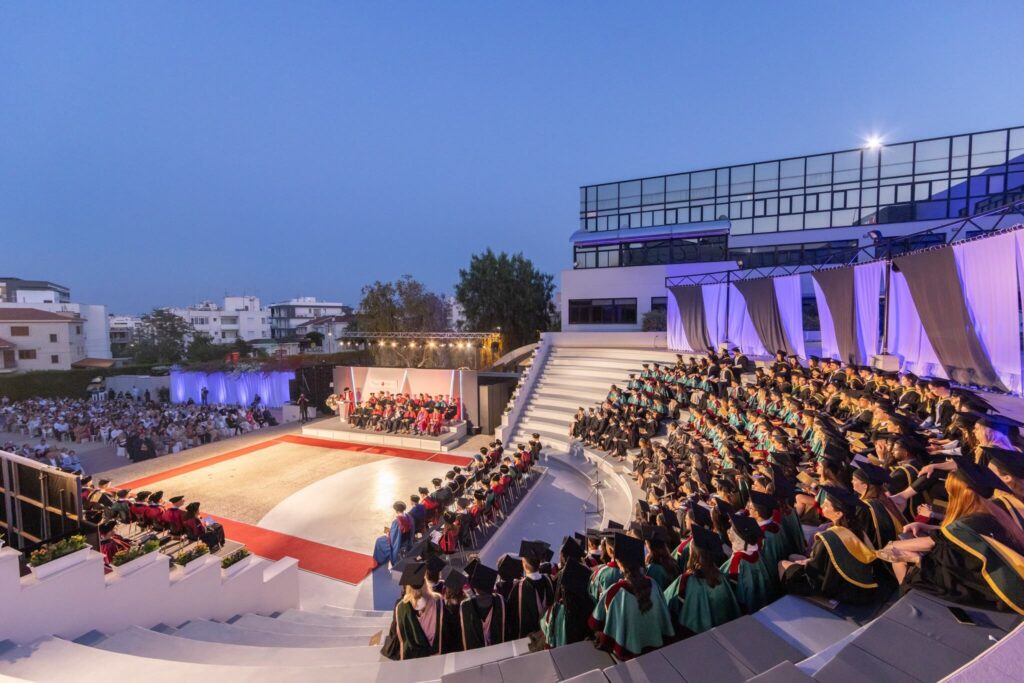

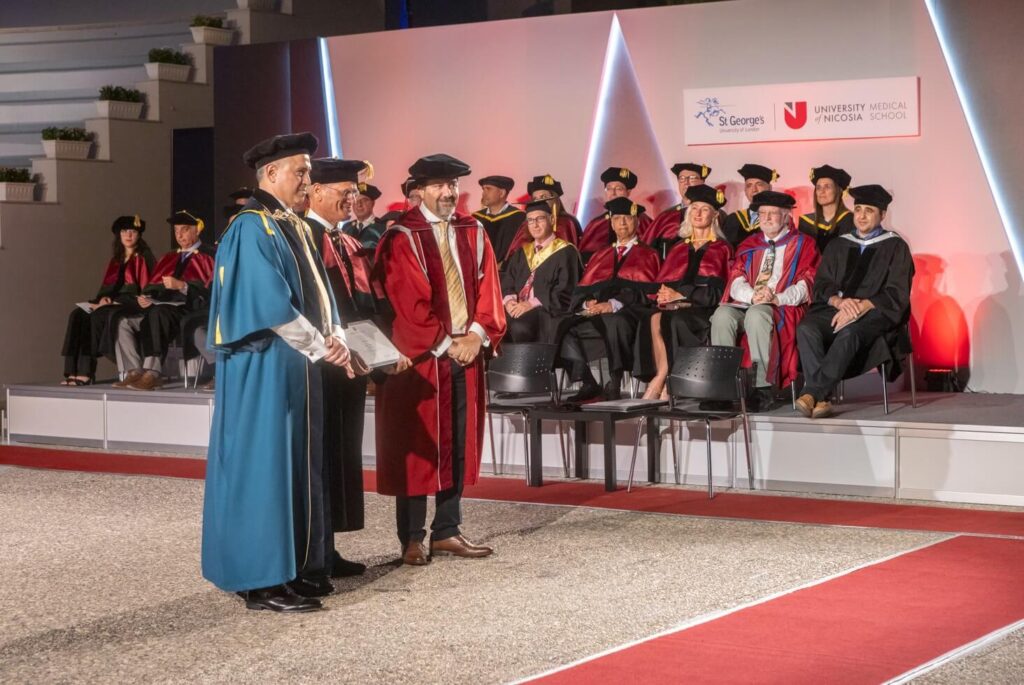

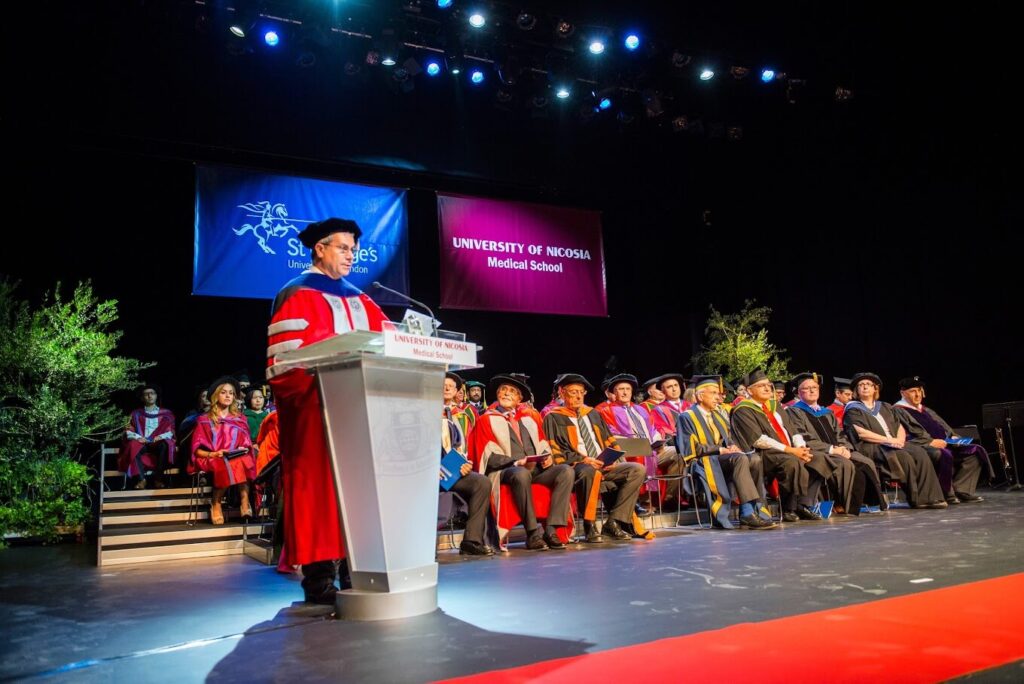

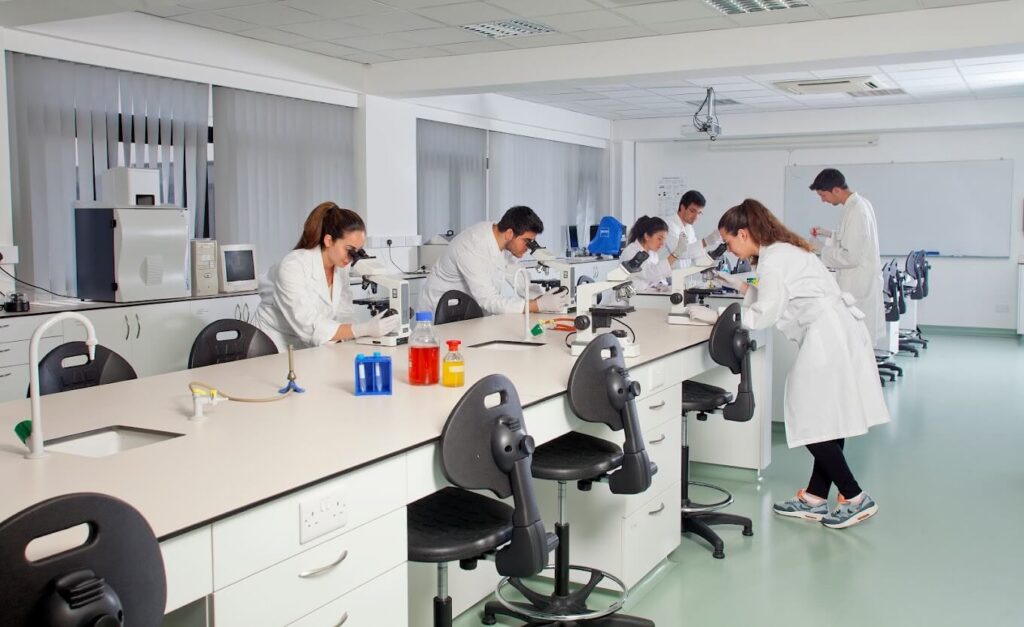

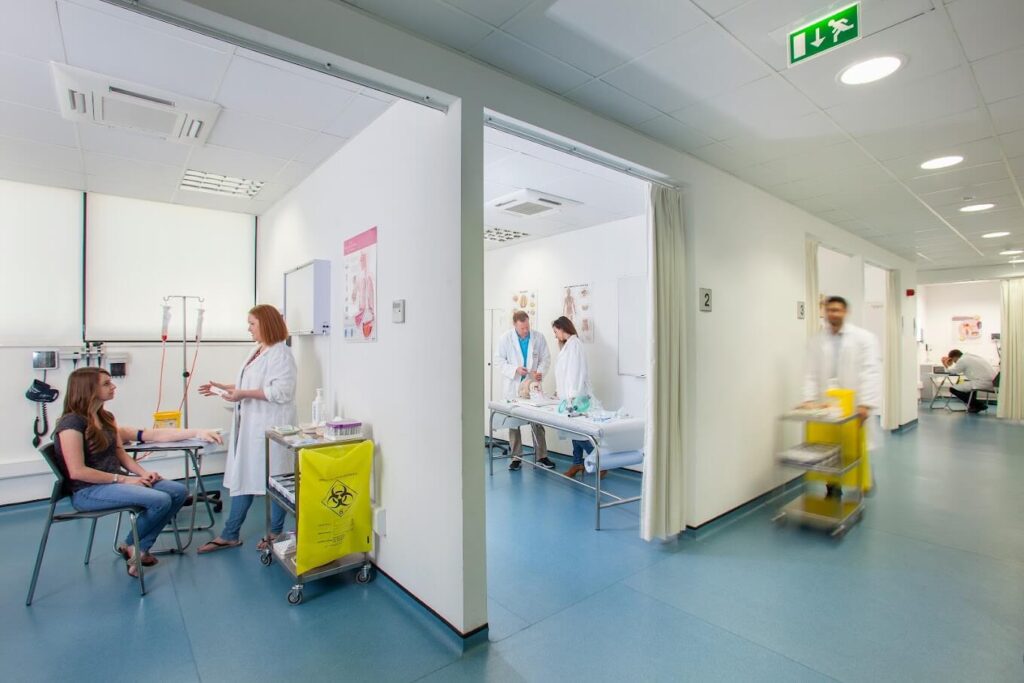

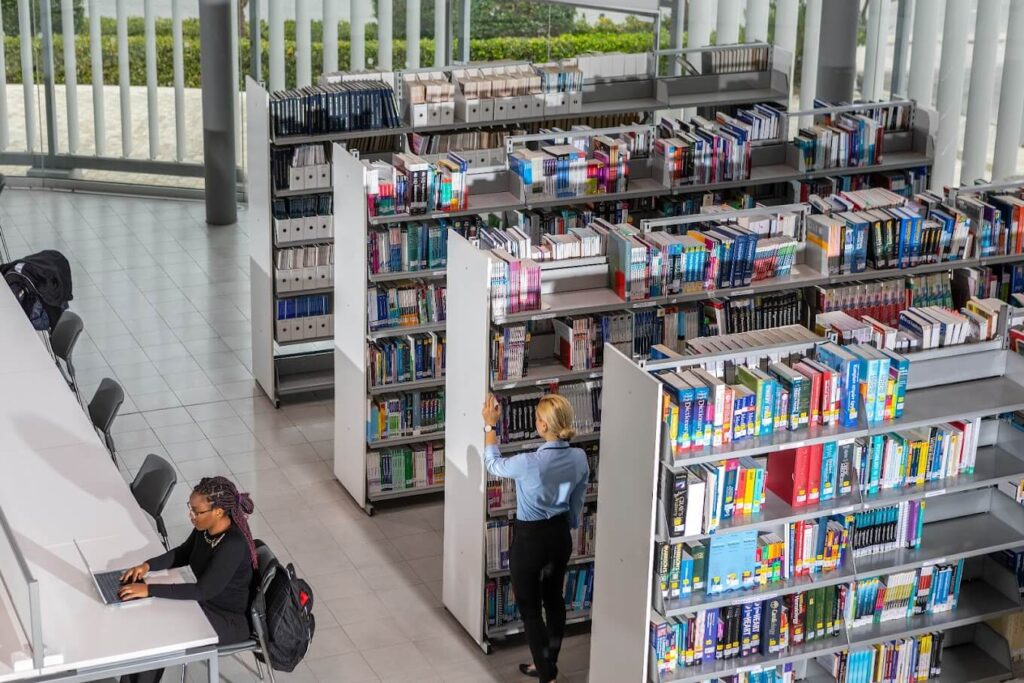

The University of Nicosia is recognised by the World Health Organisation and is listed in the World Directory of Medical Schools. It is also accredited by the medical councils of the UK, Ireland, the US, Canada, Australia, and other countries around the world. Being their student gives you a chance for the medical residency programme in the above-mentioned countries.
A degree from the University of Nicosia allows you to practise medicine worldwide.
The university boasts 3 modern dormitories considered some of the best in Europe. The total capacity is 853 studio apartments. Living here equals living in a 5-star hotel.
Needless to say, the dorms are fully equipped with luxurious furnishings, AC, fast Internet, and more. You can take advantage of dining and entertainment options such as restaurants, cafes, gyms, mini-markets, games areas, and more.
If you prefer private accommodation, living in Nicosia will cost you around according to your needs. For example, renting a 1 bedroom apartment can cost around per month, depending on how close to the center you prefer to live in. Your needs’ average costs, excluding rent, such as entertainment, food, and utilities, are around per month.
Nicosia is known as the Walled City, but the medieval Venetian fortifications are not the only walls within. Makeshift fences and stacked barrels go right through the city's center and form the borderline between Cyprus and the Turkish Republic of Northern Cyprus. This border has stood for five decades and classifies Nicosia as the last divided capital in the world.
After Cyprus' division, the Turkish and Greek populations of the city had to relocate to their respective parts of the city. The goal was to end ethnic frictions and create lasting peace on the island.
While 40 years ago, the division was a serious business with a heavy emotional toll on all parties involved, it’s mostly a formality nowadays. EU citizens can cross the border with a quick ID check, and all other nationals can use their passports instead.
Students often cross into Northern Nicosia to experience a strangely familiar yet different side of the city. Many describe it as a “touristy” version of the town with enchanting Turkish markets and lots of bargaining over purchases. It certainly lacks Starbucks and McDonald’s.
While Nicosia is a divided city with a guarded border, it is safe. The border and the extra security make Nicosia a low-crime location. Thus, international students enjoy peace of mind within the city.
The fall semester starts at the end of September and lasts until the beginning of January.
Examinations are between the 11th and 26th of January.
The Spring semester starts at the beginning of February and lasts until the end of April.
Examinations are between the 17th of May and the 1st of June.










All degrees awarded by the University of Nicosia are recognised in the EU and globally.
Yes, you can apply for a graduate entry pathway into medicine here.
Yes. In fact, the University of Nicosia is the largest private university in Cyprus.
Yes. The university welcomes student transfers.
The university is in Nicosia, Cyprus. The city is located at the foot of the Kyrenia Mountains. The school’s address is Makedonitissis 46, Nicosia 2417, Cyprus.
The tuition fees are as follows:
per year for the undergraduate entry medical degree.
And for graduate entry the fees are per year for the 5-year programme. Additional Clinical Training Supplement fees may be charged during years 4 and 5, depending on your clinical training site allocation.
Yes. The university has many programmes in English.
Yes. Between 2022 and 2024, the university has over 80 graduates registered with the UK General Medical Council.
Only students applying for the graduate entry pathway into medicine are required to take exams. They need the MCAT or the GAMSAT.
Students need a high school diploma with good grades in Biology and Chemistry, physics, or Maths. In addition, English-proficiency certificates are required for non-native speakers.
The school year starts at the end of September.
The university is in South Nicosia, the Greek part of Cyprus.
The university offers high-quality education in English. In addition, students here benefit from curious research projects and exciting extracurricular and social activities.